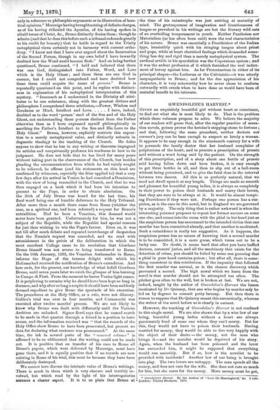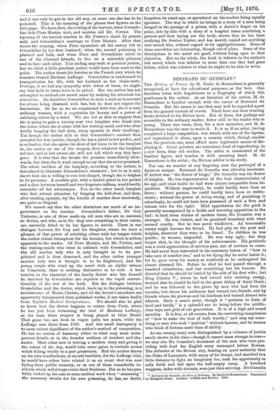GWENDOLINE'S HARVEST.*
GIVEN an exquisitely beautiful girl without heart or conscience, to find out what she is most likely to do. That is the problem which these volumes propose to solve. We believe the majority of our readers will guess that, after the regular practice of sensa- tion novels, poison proves the heroine's stepping-stone to fortune ; and that, following the same precedent, neither doctors nor coroner's jury can be base enough to suspect so lovely a woman. It appears to be easy enough in the nineteenth century for a wife to persuade the family doctor that her husband complains of palpitations of the heart, and to procure a prescription of prussic) acid without a word being said by the patient. On the strength of this prescription, and of a story about one bottle of prussio acid having fallen down and been broken, it is easy enough to get three bottles in all, and then to slip out of a ball-room without being perceived, and to give the fatal dose in the interval between two dances. All this is so perfectly natural, that we need not dwell upon it at any length. Things are made so smooth and pleasant for beautiful young ladies, it is always so completely in their power to poison their husbands and marry their lovers, that they are sure to be always at it. It would be almost tempt- ing Providence if they were not. Perhaps one person has a sus- picion, as is the case in this novel, but in England we are governed by a majority. The only thing that is rather awkward is when the interesting poisoner proposes to repeat her former success on some one else, and comes into the room with the phial in her hand just as the suspicious person has announced to the intended victim that one murder has been committed already, and that another is meditated. Such a coincidence is really too suggestive. As it happens, the suspicious person has no means of knowing that a second murder is to be committed, it is a mere guess, which turns out to be a lucky one. No doubt, it seems hard that after you have baffled doctors, coroners' juries, and all the machinery that exists for the detection of crime, you should be foiled by some one guessing that a phial in your hand contains poison ; but after all, there is some- thing consistent in this retribution. If the impunity that followed the first murder was natural, so is the chance discovery which prevented a second. The high moral which we learn from the novel is that murder should not be attempted too often. The pitcher goes often to the well, but is broken at last. We are not, indeed, taught by the author of Gwendoline's Harvest the lesson inculcated by De Quincey, that one who begins by murder mtiy be led on by degrees to commit petty larceny. But then there is reason to suppose that De Quincey meant this sarcastically, whereas the writer of the novel before us is clearly in earnest.
However, the teaching of Gwendoline's Harvest is not confined to this single moral. We are also shown that by a wise law of our being, beautiful young ladies without a heart are always passionately fond of some one whom they can't marry. But for this, they would not have to poison their husbands. Having married for money, they would be able to live very happily with the object of their desire—the money, not the man who brings it—and the novelist would be deprived of his story. Again, when the husband has been poisoned and the lover has succeeded him, it might be supposed that everything would run smoothly. But if so, bow is the novelist to be provided with incidents? Another law of our being is brought into play. The two lovers are unhappy. The man spends all the money, and does not care for the wife. She does not care so much for him, but she cares for the money. More money must be got, Owenclotines Harped. By the Author of " Lost Sir hisseingberti," dro. 2 vole. London Tinsley Brothers. 1870. and it can only be got in the old way, so some one else has to be poisoned. This is the meaning of the phrase that figures on the
title-page. We have, first, the sowing of the harvest, when Gwendo- line bids Piers Mostyn wait, and marries old Mr. Ferrier. The ripening of the harvest consists in Mr. Ferrier's death by prussic acid, and Gwendoline's marriage to Piers Mostyn. After that
comes the reaping, when Piers squanders all the money left to Gwendoline by her first husband; when the second poisoning is planned and fails, and when Piers and Gwendoline retire to one of the Channel Islands, to live on a miserable pittance and to hate each other. This ending may rank as poetical justice, but we think a little practical justice would have been more to the point. The author treats his heroine as the French jury which he censures treated Madame Laffarge. Gwendoline is condemned to transportation for life, with her husband as her chain-mate. Perhaps, if we had any sympathy with either of them, we might say that both in turns were to be pitied. But the author has not attempted to mislead our moral sense by making his criminals too attractive. He describes Gwendoline in such a style as to account for others being charmed with her, but he does not impart the fascination. So far as we are acquainted with her, she is a very ordinary woman, with a reputation for beauty and a power of .subduiug others by a word. We are led at first to suppose that she is going to gain a victory over two burglars who break into the house where she is alone with her waiting-maid, and who after loudly banging the hall door, creep upstairs in their stockings. Yet though the author tells us that Gwendoline's conduct then revealed her true nature, though she has a pistol in her pocket, and is so fearless that she opens the door of her room to let the burglars in, she makes no use of the weapon, does whatever the burglars tell her, and at last swears she will not tell which way they have gone. It is true that she breaks the promise immediately after- wards, but then she is weak enough to say that she never promised. 'The whole incident of the burglary, according to the author, is introduced to illustrate Gweudoline's character ; but to us it only -shows that she is willing to run into danger, though she is helpless in its presence. A resolute girl, with a loaded pistol in her pocket and a door between herself and two desperate ruffians, would hardly -surrender all her advantages. Yet, on the other hand, burglars who first attract attention by banging the hall-door, and then, after stealing upstairs, try the handle of another door cautiously, are quite as illogical.
We cannot say that the other characters are much of an im- provement on the heroine. Gwendoline's father, Sir Guy Treheme, is one of those made-up old men who are so common in fiction, and who, as in life they owe everything to their valets, are naturally fitted to be lay figures in novels. There is one -dialogue between Sir Guy and his daughter, where we have a ,glimpse of that power of subduing others with her tongue which the author claims throughout for his heroine, but which is seldom apparent to the reader. Of Piers Mostyn, and Mr. Ferrier, and the waiting-maids who come in collision with Gwendoline, and the old maiden lady who is only brought in to be pro- pitiated and is then dismissed, and the other rather younger maiden lady who is brought in to be frightened, and the young couple who wind up the novel with an idyllic retreat in Venezuela, there is nothiug distinctive to be said. A few touches in the character of the family doctor who lets himself be deceived by Gwendoline are superior to the vapid conven- tionality of the rest of the book. But the dialogue between
• Gwendoline and the doctor, which leads up to the poisoning, is a reminiscence of Monte Christ°, and all the doctor's anecdotes are apparently transplanted from published works, if not taken bodily from Taylor's Medical Jurisprudence. We should also be glad to know how the doctor happens to return from Paris, where he has just been witnessing the trial of Madame Laffarge, at the time when croquet is being played at Glen Druid. 'That game has not been in vogue quite ten years, while the Laffarge case dates from 1839. And this small discrepancy is to some extent significant of the author's method of composition. .He has no notion of harmony either in what may seem unim- portant details, or in the broader outlines of incident and cha- racter. Most other men in writing a modern story and giving it the colour of the day, would take some pains to exclude scenes which belong wholly to a past generation. Had the author drawn on his own recollections, or on oral tradition, for the Laffarge trial, he would have either have related it as an event that was now fading from public memory, or as one of those remarkable in- cidents which will always retain their freshness. But as he has pro- bably looked up the case in some medical work when " cramming " the necessary details for his own poisoning, he has, no doubt,
forgotten its exact age, or speculated on his readers being equally ignorant. The way in which he brings in a story of a man being hanged in the.passage of a prison with a doctor's finger on his pulse, side by side with a story of a hospital nurse murdering a patient and then laying out the body, shows that he has been studying Dr. Swaine Taylor, and has merely copied out anything that struck him, without regard to its appropriateness. Some of these anecdotes are interesting, though out of place. Some of the descriptions in the novel are good, without being open to that objection. But on the whole, the book is inferior to the author's last novel, which was inferior to more than one that had gone before, which was inferior to what he ought to be able to write.































 Previous page
Previous page